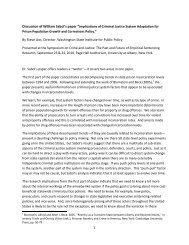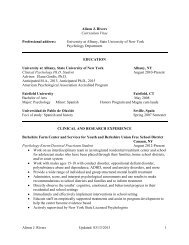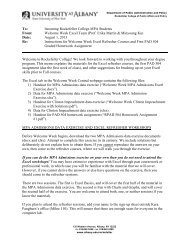Walking Corpses & Conscious Plants: Possibilist Ecologies in ...
Walking Corpses & Conscious Plants: Possibilist Ecologies in ...
Walking Corpses & Conscious Plants: Possibilist Ecologies in ...
You also want an ePaper? Increase the reach of your titles
YUMPU automatically turns print PDFs into web optimized ePapers that Google loves.
1<br />
Accord<strong>in</strong>g to comics historian Robert C. Harvey, “The cover dates on comic books are not equivalent to the months of<br />
publication. Because of the vagaries of newsstand sales, comic books are cover-dated a month or more after their<br />
scheduled publication date. Any given issue of a periodical is presumed to be outdated by the time the next issue<br />
appears, so retailers customarily dispose of “last month's” issue of a comic book or magaz<strong>in</strong>e when “this month's” issue<br />
arrives. But if this month's issue late <strong>in</strong> arriv<strong>in</strong>g (or never arrives—always a possibility <strong>in</strong> the early days of comic book<br />
publish<strong>in</strong>g), last month's issue will stay on the stand until the month of its cover-date is past. Thus, cover-dat<strong>in</strong>g a comic<br />
book a month or more after its actual date of publication provides a way of giv<strong>in</strong>g it a longer newsstand life. For<br />
example, if a comic book is published <strong>in</strong> January but cover-dated March (a typical <strong>in</strong>terval between dates), it can stay on<br />
the newsstand for as long as three months, dur<strong>in</strong>g which time it is more likely to sell out than if it were cover-dated<br />
February and removed from the stands at the end of that month. (275-276).<br />
Harvey, Robert C. The Art of the Comic Book: An Aesthetic History. Jackson: University Press<br />
of Mississippi, 1996. pp. 275-276.<br />
2<br />
An <strong>in</strong>terest<strong>in</strong>g anecdote about Len We<strong>in</strong> and Alan Moore's first conversation:<br />
“I wish I could remember at this late date exactly what it was that prompted me to call Alan when I was look<strong>in</strong>g for<br />
a new writer to take over Swamp Th<strong>in</strong>g. I know I had been a fan of Alan's work on 2000 A.D. and so he seemed an<br />
<strong>in</strong>terest<strong>in</strong>g choice as writer, assum<strong>in</strong>g, of course, he was available and so <strong>in</strong>cl<strong>in</strong>ed. I got his phone number somehow,<br />
made the <strong>in</strong>ternational phone call, and Alan answered on the third r<strong>in</strong>g. I <strong>in</strong>troduced myself, told Alan I had an offer to<br />
make him, and he hung up on me.<br />
When I called back, assum<strong>in</strong>g the connection had been broken accidentally, I <strong>in</strong>troduced myself aga<strong>in</strong>. Alan's<br />
reply: “No, who is this really?” And he started go<strong>in</strong>g through a list of his mates, try<strong>in</strong>g to figure out who had put me up<br />
to this and why. It took me quite awhile to conv<strong>in</strong>ce Alan I was <strong>in</strong>deed me, and that I was <strong>in</strong>terested <strong>in</strong> offer<strong>in</strong>g him<br />
work <strong>in</strong> the states, on my own precious baby. It took a lot of cajol<strong>in</strong>g and conv<strong>in</strong>c<strong>in</strong>g to talk Alan <strong>in</strong>to tak<strong>in</strong>g on the<br />
assignment, but I'm glad he did. The changes he made on Swamp Th<strong>in</strong>g helped to revolutionize the art form, his<br />
language was pure music. Under Alan, the graphic narrative suddenly grew up. And the comic book <strong>in</strong>dustry has never<br />
been the same s<strong>in</strong>ce.”<br />
We<strong>in</strong>, Len. “Random Thoughts: April 2003.” Alan Moore: Portrait of an Extraord<strong>in</strong>ary<br />
Gentleman. Ed. Gary Spencer Millidge and smoky man. London: Abiogenesis Press, 2003. pp. 37.<br />
3<br />
In this issue, Sunderland's title and first name are not supplied. His last name is only mentioned twice: first on panel 5<br />
of page 26 (pg. 14 <strong>in</strong> the orig<strong>in</strong>al publication) and second <strong>in</strong> reference to his company's resources <strong>in</strong> panel 4 of page 29<br />
(pg. 17 orig<strong>in</strong>ally).
















